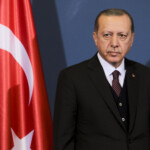In the past two weeks much of the world’s attention was on France. The wave of protests and violence, which shattered several major cities, was sparked by the murder of a 17-year old by the police. The incident also brought up underlying problems in France’s suburbs, discrimination against immigrant populations, and widespread accusations of racism within France’s security branches.
Although many reactions from the external world focused on concerns and calls for confronting the reasons behind social tensions, statements from Turkey and Iran took a hard line against the French government. Both countries emphasized “institutional racism” as part of France’s political culture and its colonialist past.
French daily Le Figaro addressed the subject in an interview with a prominent scholar, Prof Hamit Bozarslan. Author of the book “Anti-democracy in the 21st century – Iran, Russia, Turkey,” Bozarslan is a historian, political scientist and director of studies at the École des Hautes Etudes en Sciences Sociales (EHESS) in Paris. Below is a shortened version of the interview, translated from the French by FTP.
Iran and Turkey have criticized events in France. Erdoğan castigated the institutional racism of our country; Iran criticized the “discriminatory” relations maintained by the French State “with the immigrant population.” Are you surprised by these positions?
No, not at all. To tell the truth, I was even surprised by the moderate tone that China adopted compared to others. Iran and Turkey propagate the idea that Muslims in France are about to suffer genocide and that the French police will show great brutality towards them.
In Anti-democracy in the 21st century – Iran, Russia, Turkey [CNRS editions, 2021], I wrote that “anti-democracy” rhetoric continues to desecrate democracies, to present them as countries where chaos reigns, where justice is non-existent and above all unfair to Muslims. They transform this into an ontological identity question. The West is presented as a danger not only for Muslim communities but also for Islam as such. This is a constant that has been observed for a very long time.
What objectives are Ankara and Tehran pursuing? Are they part of diplomacy, of domestic politics?
Their objectives are justified by their raison d’être, but in Turkey it does not work. The situation is such, despite Erdogan’s electoral victory, that there are no more landmarks in society and no longer any trust in the system.
In Iran, this anti-Western feeling that the regime wants to feed also tends to disappear. This is seen, for example, during the last demonstrations organized by the Iranian government against the “Women, life, freedom!” movement, which mobilized only a few hundred people aged 60 to 70. Internally, therefore, I do not have the impression that these statements can arouse enthusiasm on the part of the population.
But this says a lot about the ideology and identity of these regimes, their vision of the world and their ability to justify their raison d’être and imagine a world in total chaos.
Erdoğan’s words can be linked to the words of Steve Bannon, conspiracy theorist and Donald Trump’s far-right advisor: they both describe a world in total chaos, and collapsing; a world where democratic spaces have become places of absolute savagery. For some it is because of immigrants, for others because of power. In short, they define democracies not from their institutional functioning, from the rule of law, but from this risk of absolute collapse.
How can we explain that Tehran says “we recommend the French government and the police pay attention to the demands of the demonstrators while showing restraint and avoiding all violence” when repression in Iran is still bloody?
We saw repression in Iran, with the movement in 2022, but also in 2019 and 2014. And in Turkey with full prisons and the LGBT movement repressed on the occasion of the Pride March.
The United States, France and Great Britain have said that a disproportionate force should not be used towards demonstrators in Iran. And Iran and Turkey are using` a similar rhetoric to create a kind of equalization. It’s as if all these powers were on the same level: you give us lessons, we give you lessons. It’s a way to give them back the change of their coin.
Are Turkey and Iran trying in mirror to present themselves as models of democracy?
These countries want to present themselves as havens of peace and stability. Since in other countries such demonstrations may exist, Turkey and Iran try to present themselves as stable in contrast and able to guarantee the safety of their citizens.
These regimes do not consider that they conduct a campaign of stigmatization and repression against their opponents, and instead present themselves as a superior alternative, by far, to democracy.
They also represent themselves as spaces where human rights are respected, as non-repressive regimes. There is a kind of inversion and total perversion of the data.
Turkey claims that France has a problem with its colonial past. However, Turkey is also a country that has a problem with its minorities and its past. How can Erdoğan justify this kind of speech?
For Erdoğan, in Islam there is no genocide; it does not exist in the Koran. But genocide exists elsewhere, so the colonial past is a genocidal past for the Turks.
What is happening in Palestine is also a genocidal repression, according to the Turkish President. And he says that Muslims in Europe are threatened in their very existence. He analyzes the world based on what is Islamic and what is not; human rights are only defined on the basis of this criterion of religious affiliation.
There is on one side the “oppressed Islam,” and this colonial past of part of the democracies – especially Great Britain and France – which continues today with repression against Muslims. On the other hand, there is Islam in which there is no repression or genocide.
Turkey considers that it has no problem with its past in relation to minorities such as Armenians or Jews (while there were very brutal anti-Semitic campaigns in 1933-1934 in Turkey). The history of the world is therefore reduced for these countries to a confrontation between on the one hand a “collective West” that would be anti-Muslim, and on the other this entity and religion always oppressed by this collective West: Islam.
You mention Russia, but Dimitri Medvedev also had similar remarks against France. How to explain this unanimity? What unites Russia, Turkey and Iran?
What brings them together is first and foremost an absolute identity definition of the nation: their nation has a pure ontology, but it is threatened by impure, corrupting ontologies that come from outside.
This is the construction of the collective West—the term is frequently used in Russia and Turkey—there are no longer differences between the different Western countries for them, and they make a totally falsified reading of history.
For Russia, the history of the world is the history of the world’s war against Russia, the First World War is not a European war but the war of the destruction of Russia by Europe; the Second World War is the war of the West against Russia. We find a similar perception in Turkey, where we see in the First World War a destruction of the Ottoman Empire by the West.
Turkish official historiography forgets that the Ottoman Empire went to war on its own without any provocation and that it was the ally of Germany and Austria-Hungary. There is therefore a falsification of history that creates this image of the world.
But this story no longer operates today, even though it was able to walk in the past – in the 1980s in Iran, in the 2000s in Russia. From now on, this speech is totally worn out, but still repeated.
You wrote about “decivilization”. Do you observe this process at work? Is it more marked in France than in Turkey and Iran?
It is obvious that there are structural problems in France that are not new, these problems work in favor of extremely massive economic crises, the violence that appears on these occasions can become systemic. But it is a violence that does not find mediation, that does not lead to a structuring of the social space, which has no intermediary.
There is a protest movement that can be extremely violent, which is subject to extremely serious structural problems. And we can observe similar events in other countries, such as in Great Britain in Manchester and Birmingham, in Sweden – although it has no colonial history – in Malmö and Gothenburg.
There is a recurring phenomenon that questions democracies and their structural problems. Democracies have made a lot of progress over the last 50 years in terms of freedom, but there has been no progress in terms of equality, status or income.
However, I do not believe that we can speak of a problem of decivilization, a phenomenon that rather concerns countries like Syria, where the state had collapsed and had become a country where a predatory militia coexisting with other predatory militias; where society has been annihilated in the true sense of the word.
But in the case of France the term seems to me quite excessive. I would also not use it in the context of Iran or Turkey; on the other hand, the First World War in Iran and Turkey corresponded to a process of decivilization, and the Armenian genocide, which was also the genocide of other Christian communities, constituted the paroxysmal degree of this process.
This interview was originally published in French by Le Figaro. It has been translated and abridged by FTP.


